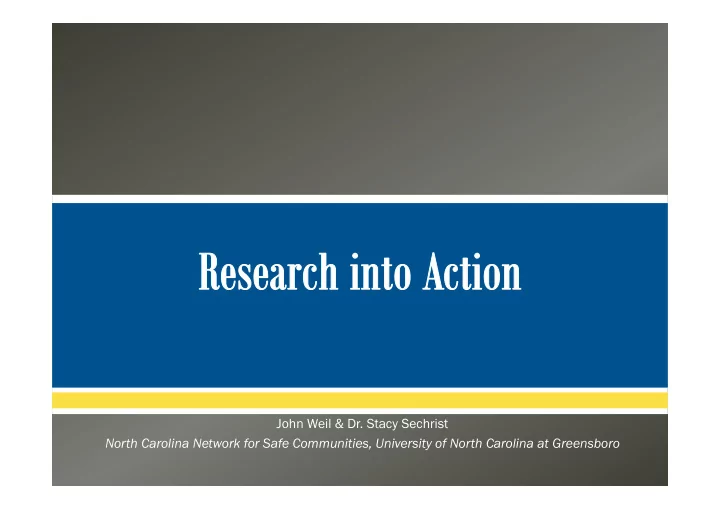

John Weil & Dr. Stacy Sechrist North Carolina Network for Safe Communities, University of North Carolina at Greensboro
UNCG has been the PSN MDNC research and training/technical assistance partner for over 15 years. Their role in PSN has developed to include: � Provision of operationally relevant on-the-ground training and technical assistance to sites � Convener of partners statewide doing PSN work to share best practices � Documenter of best practices in PSN and other focused deterrence work � Research and evaluation to measure the impact of violence reduction work 2
PSN partnership guidelines: � Partnership is built by having data-driven strategies � Leads to transparency in the process � Builds accountability � Through transparency and accountability, true partnership and trust is built amongst stakeholders
� Show what is effective in our strategies. o What is working? � Identify where to improve or adapt. o What is not working? � Through data collection and analysis, we can examine our current status in reference to where we were before. o Are we doing better now than we were before?
� We have learned many lessons in the implementation and sustainability of violence reduction strategies and the partnerships necessary to make them thrive. � How do we measure success of a strategy? o Depends on who you ask… � Define what success looks like to multiple partners involved including the community and those invested in offenders o Violence reduction alone as an outcome does not take into account the mechanisms needed to change the trajectory of offenders • BUT Re-entry and other programs do! � We need to take a holistic approach when determining the success of an initiative and use lessons learned to inform current strategies and strengthen prevention efforts.
� Define o What is success? Have we accounted for all input? � Operationalize o What specifically do we measure to determine if an initiative has been successful? Is it feasible to measure? � Track o Do we have systems in place to track measures over time? � Analyze o What does the data tell us? Do we have meaningful data we can compare to? � Interpret and Apply o What do analysis results mean in terms of real world application? • Who specifically does the intervention work for? Who does it not work for? o Can we use data to make improvements to the initiative? � Report and Disseminate o Get the information back out to the stakeholders invested in the initiative
� With the current vision, what outcomes will we want to measure to determine how effective the strategy is? � What do we do with the results of our evaluation?
� Pre- and post-PSN implementation success All sites show reductions • in violent crime rate since PSN inception. UNCG, a neutral third • party, produced a brochure highlighting this success with USAO funding. Brochure is used for • marketing and educational purposes.
Pre and Post OFVDI Comparison of Quarterly Pre and Post OFVDI Comparison of Quarterly Pre and Post OFVDI Comparison of Quarterly Pre and Post OFVDI Comparison of Quarterly IPDV Arrest Incidents IPDV Arrest Incidents IPDV Arrest Incidents IPDV Arrest Incidents 300 Actual 13% reduction 250 Projected 98% PQ20: PQ20: PQ20: PQ20: increase Number of IPDV arrest incidents Number of IPDV arrest incidents Number of IPDV arrest incidents Number of IPDV arrest incidents Oct Oct Oct- Oct - -Dec - Dec Dec Dec Q12: Q12: Q12: Q12: 200 2013 2013 2013 2013 Oct Oct Oct Oct- - - -Dec Dec Dec Dec Pre Actual 2014 2014 2014 2014 Pre Q1: Q1: Q1: Q1: Deseasonalized Jan- Jan Jan Jan -Mar - - Mar Mar Mar Post Actual 2012 2012 2012 2012 150 Post Q12: Q12: Q12: Q12: Deseasonalized Oct- Oct Oct Oct - - -Dec Dec Dec Dec PQ20: PQ20: PQ20: PQ20: 2011 2011 2011 2011 Oct Oct Oct Oct- - -Dec - Dec Dec Dec 100 Projected 2016 2016 2016 2016 41% Q1: Q1: Q1: Q1: reduction Jan- Jan Jan Jan - -Mar - Mar Mar Mar 2009 2009 2009 2009 50 Trend based predictions for two years Trend Trend Trend based predictions for two years based predictions for two years based predictions for two years 0 1 2 3 4 5 6 7 8 9 10 11 12 13 14 15 16 17 18 19 20 Q1 Q2 Q3 Q4 Q1 Q2 Q3 Q4 Q1 Q2 Q3 Q4 PQ1 PQ2 PQ3 PQ4 PQ1 PQ2 PQ3 PQ4
UNCG believes in contributing perspectives in best practices, sharing best practices, and documenting them. � Developed a training and technical assistance manual for gang/group strategy implementation � Documented High Point’s domestic violence implementation process and is doing ongoing evaluation � Has fostered peer-to-peer mentoring to better teach best practices across sites
UNCG is on the ground and involved in the implementation of strategies with new sites and sustainability of strategies within existing sites, ensuring fidelity in the process. � Violent Incident Review/Group Audits (data collection) � Community & Law Enforcement Training (strategy) o Available for immediate assistance to site partners � Call-in Rehearsals/Preparation/Debriefing/Feedback (fidelity) � Longitudinal data collection (evaluation)
UNCG has been relevant to the livelihood of MDNC sites and bridged a statewide partnership in the PSN effort. � Research and data analysis is but one important piece of UNCG’s contribution to the effort. � They are a trusted resource that sites can rely on for information and data analysis/interpretation. � They play a vital role in assisting sites to be smart on crime by ensuring that sites move smoothly through the implementation process and sustain over time. � Looking forward to continued partnership in the new vision.
John John John John Weil Weil Weil Weil jdweil@uncg.edu Dr. Stacy Dr Dr Dr . Stacy . Stacy Sechrist . Stacy Sechrist Sechrist Sechrist smsechri@uncg.edu North Carolina Network for Safe Communities Website: ncnsc.uncg.edu
Recommend
More recommend